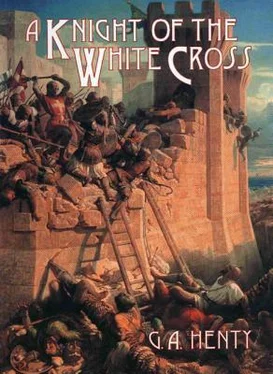Lord Montague now threw off the mask, and declared for King Henry. Most of the soldiers followed him, and Edward, finding it hopeless to oppose Warwick's force, which was now within a short march of him, took ship with a few friends who remained faithful, and sailed for Holland. Warwick returned to London, where he took King Henry from the dungeon in the Tower, into which he himself had, five years before, thrown him, and proclaimed him king.
On the day that this took place Dame Tresham arrived in London with her son. The queen had found that she could not for the present cross, as she was waiting for a large French force which was to accompany her. As it was uncertain how long the delay might last, she counselled her friend to join her husband. The revolution had been accomplished without the loss of a single life, with the exception of that of the Earl of Worcester, who was hated for his cruelty by the people. Edward's principal friends took refuge in various religious houses. The queen, her three daughters, and her mother, fled to the sanctuary at Westminster. All these were left unmolested, nor was any step taken against the other adherents of the House of York. Warwick was now virtually King of England. The king, whose intellect had always been weak, was now almost an imbecile, and Margaret of Anjou was still detained in France. Sir Thomas Tresham went down to his estates in Kent, and there lived quietly for some months. The Duke of Clarence had joined Warwick as soon as he saw that his brother's cause was lost; and as the Duke had no knowledge of his changed feelings towards him, he was heartily welcomed. An act of settlement was passed by Parliament entailing the Crown on Henry's son Edward, Prince of Wales, and in case of that prince's death without issue, on the Duke of Clarence. On the 12th of March following (1471) Edward suddenly appeared with a fleet with which he had been secretly supplied by the Duke of Burgundy, and, sailing north, landed in the Humber. He found the northern population by no means disposed to aid him, but upon his taking a solemn oath that he had no designs whatever upon the throne, but simply claimed to be restored to his rights and dignities as Duke of York, he was joined by a sufficient force to enable him to cross the Trent. As he marched south his army speedily swelled, and he was joined by many great lords.
Warwick had summoned Henry's adherents to the field, and marched north to meet him. When the armies approached each other, the Duke of Clarence, who commanded a portion of Henry's army, went over with his whole force to Edward, and Warwick, being no longer in a position to give battle, was obliged to draw off and allow Edward to march unopposed towards London. The citizens, with their usual fickleness, received him with the same outburst of enthusiasm with which, five months before, they had greeted the entry of Warwick. The unfortunate King Henry was again thrown into his dungeon in the Tower, and Edward found himself once more King of England.
Sir Thomas Tresham, as soon as he heard of the landing of Edward, had hastened up to London. In his uncertainty how matters would go, he brought his wife and son up with him, and left them in lodgings, while he marched north with Warwick. As soon as the defection of Clarence opened the road to London, he left the Earl, promising to return in a few days, and rode to town, arriving there two days before Edward's entry, and, purchasing another horse, took his wife and son down to St. Albans, where leaving them, he rejoined Warwick. In a few days the latter had gathered sufficient forces to enable him to risk the fortunes of a battle, and, marching south, he encamped with his army on the common north of Barnet. Edward had come out to meet him, and the two armies slept on Easter Eve within two miles of each other.
Late in the evening Clarence sent a messenger to the Earl, offering to mediate, but the offer was indignantly refused by Warwick.
In the darkness, neither party was aware of the other's precise position. Warwick was much stronger than the king in artillery, and had placed it on his right wing. The king, in his ignorance of the enemy's position, had placed his troops considerably more to the right than those of Warwick's army. The latter, believing that Edward's line was facing his, kept up a heavy cannonade all night upon where he supposed Edward's left to be — a cannonade which was thus entirely futile.
In the morning (April 14th) a heavy mist covered the country and prevented either force from seeing the other's dispositions. Warwick took the command of his left wing, having with him the Duke of Exeter. Somerset was in command of his centre, and Montague and Oxford of his right.
Edward placed himself in the centre of his array, the Duke of Gloucester commanded on his right, and Lord Hastings on his left.
Desirous, from his inferiority in artillery, to fight out the battle hand to hand, Edward, at six o'clock in the morning, ordered his trumpets to blow, and, after firing a few shots, advanced through the mist to attack the enemy. His misconception as to Warwick's position, which had saved his troops from the effects of the cannonade during the night, was now disadvantageous to him, for the Earl's right so greatly outflanked his left that when they came into contact Hastings found himself nearly surrounded by a vastly superior force. His wing fought valiantly, but was at length broken by Oxford's superior numbers, and driven out of the field. The mist prevented the rest of the armies from knowing what had happened on the king's left. Edward himself led the charge on Warwick's centre, and having his best troops under his command, pressed forward with such force and vehemence that he pierced Somerset's lines and threw them into confusion.
Just as Warwick's right had outflanked the king's left, so his own left was outflanked by Gloucester. Warwick's troops fought with great bravery, and, in spite of the disaster to his centre, were holding their ground until Oxford, returning from his pursuit of the king's left, came back through the mist. The king's emblem was a sun, that of Oxford a star with streaming rays. In the dim light this was mistaken by Warwick's men for the king's device, and believing that Oxford was far away on the right, they received him with a discharge of arrows. This was at once returned, and a conflict took place. At last the mistake was discovered, but the confusion caused was irreparable. Warwick and Oxford each suspected the other of treachery, and the king's right still pressing on, the confusion increased, and the battle, which had been so nearly won by the Earl, soon became a complete defeat, and by ten in the morning Warwick's army was in full flight.
Accounts differ as to the strength of the forces engaged, but it is probable that there was no great inequality, and that each party brought some fifteen thousand men into the field. The number of slain is also very uncertain, some historians placing the total at ten thousand, others as low as one thousand; but from the number of nobles who fell, the former computation is probably nearest to the truth. Warwick, his brother Montague, and many other nobles and gentlemen, were killed, the only great nobles on his side who escaped being the Earls of Somerset and Oxford; many were also killed on Edward's side, and the slaughter among the ordinary fighting men was greater than usual.
Hitherto in the battles that had been fought during the civil war; while the leaders taken on the field were frequently executed, the common soldiers were permitted to return to their homes, as they had only been acting under the orders of their feudal superiors, and were not considered responsible for their acts. At Barnet, however, Edward, smarting from the humiliation he had suffered by his enforced flight from England, owing to the whole country declaring for his rival, gave orders that no quarter was to be granted. It was an anxious day at St. Albans, where many ladies whose husbands were with Warwick's army had, like Dame Tresham, taken up their quarters. It was but a few miles from the field of battle. In the event of victory they could at once join their husbands, while in case of defeat they could take refuge in the sanctuary of the abbey. Messengers the night before had brought the news that the battle would begin at the dawn of day, and with intense anxiety they waited for the news.
Читать дальше












